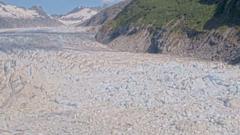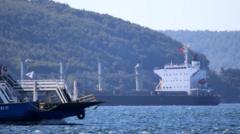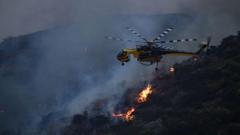Fast-moving wildfires are wreaking havoc in Greece, particularly in Patras, where evacuations have become necessary due to extreme heat and devastating conditions. The crisis has extended across southern Europe, prompting massive firefighting efforts amid rising heatwaves and concerns over climate impacts.
Infernos Rage Across Southern Europe as Heatwave Intensifies

Infernos Rage Across Southern Europe as Heatwave Intensifies
Wildfires threaten major cities in Greece and beyond as soaring temperatures and fierce winds exacerbate the ongoing crisis.
Wildfires are currently raging across southern Europe, posing a significant threat to major cities as extreme heatwaves continue to escalate. The Greek city of Patras, home to approximately 200,000 residents, is facing dire conditions as fierce winds and soaring temperatures propel flames toward its outskirts. As a result, authorities have initiated evacuations, including the urgent removal of patients from a children's hospital, while smoke clouds engulf the skyline.
In just two days, nearly 10,000 hectares of land in the Achaia region surrounding Patras have been consumed by flames. Entire villages have been abandoned, numerous homes and businesses have been reduced to ashes, and more than 500 vehicles, including those in a customs yard, have been incinerated by the wildfires. The streets of Patras have turned eerily silent, with only a handful of residents watching this disaster unfold against a backdrop of oppressive heat and choking smoke.
Due to the dangerous conditions, authorities ordered the evacuation of a nearby town with a population of about 7,700, while fresh evacuation alerts were declared for two additional villages. The fires' reach extends to the islands of Zante and Chios, where coastguard efforts have resulted in the rescue of dozens of vacationers. Greece has reached out to the EU for additional water bombers to assist over 4,800 firefighters battling more than 20 active wildfires across the nation.
The wildfire crisis coincides with an alarming heatwave that has overtaken southern Europe, igniting extensive flames from Portugal to the Balkans. Spain has reported the deaths of both a civilian and a volunteer firefighter during this period of extreme heat, which has persisted. The temperature peaked at a staggering 45C just one day prior. The state weather agency of Spain has classified nearly all regions at extreme or very high fire risk, warning that this unprecedented heatwave could last until the upcoming Monday.
Political tensions have arisen as comments made by Spain's transport minister Oscar Puente sparked controversy, as he chastised the conservative leaders on holiday during the crisis. Opposition leaders quickly condemned his remarks, demanding accountability for leadership amid ongoing emergencies.
In total, 199 wildfires have devastated almost 99,000 hectares in Greece alone this year, a figure that reflects double the wildfire damage recorded by mid-August in the previous year. Several incidents are suspected to stem from arson.
The situation in neighboring Portugal remains critical, with 1,800 firefighters engaged in combat against multiple significant wildfires, including a revived blaze in Trancoso sparked by lightning. The Albanian defense minister has also labeled this week as critical as 24 wildfires burn across the nation, leading to the evacuation of several central villages.
In Italy, the remnants of a five-day fire on Mount Vesuvius have finally been quelled, but the nation remains under severe heat warnings affecting 16 cities, with Florence registering temperatures of 39C. The extreme conditions have prompted the Pope to relocate his weekly audiences from St. Peter's Square to an indoor venue.
Britain is also under the grip of its fourth heatwave this summer, with anticipated peak temperatures of 34C, leading health officials to caution about the potential strain on healthcare services. Scientists attribute the increasing intensity and frequency of such extreme weather conditions to climate change driven by human activity, raising urgent questions about future preparedness and resilience against natural disasters.




















